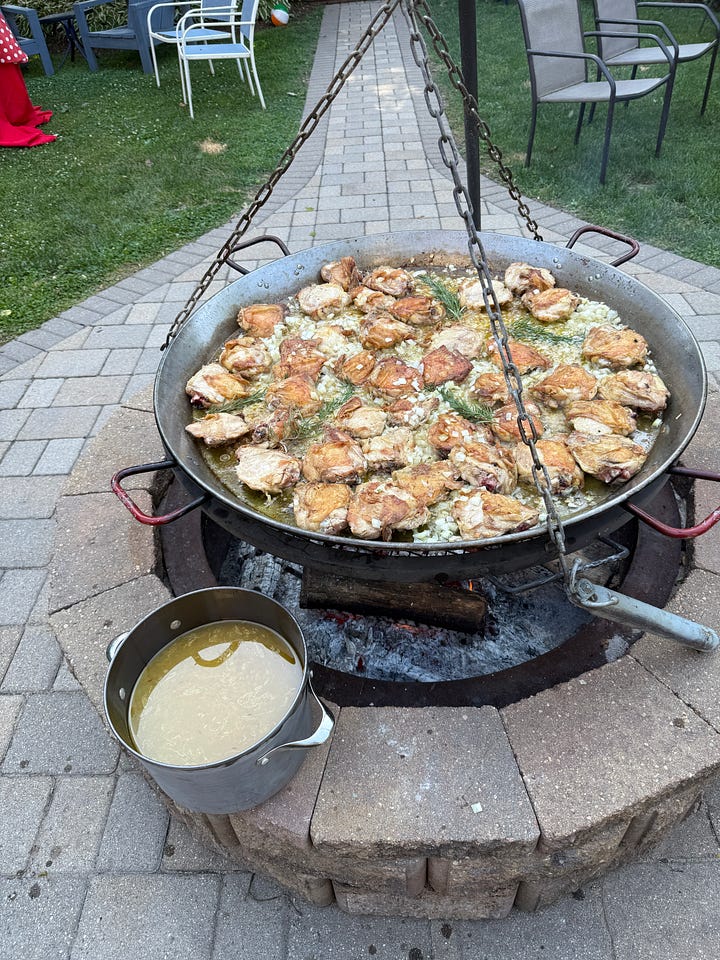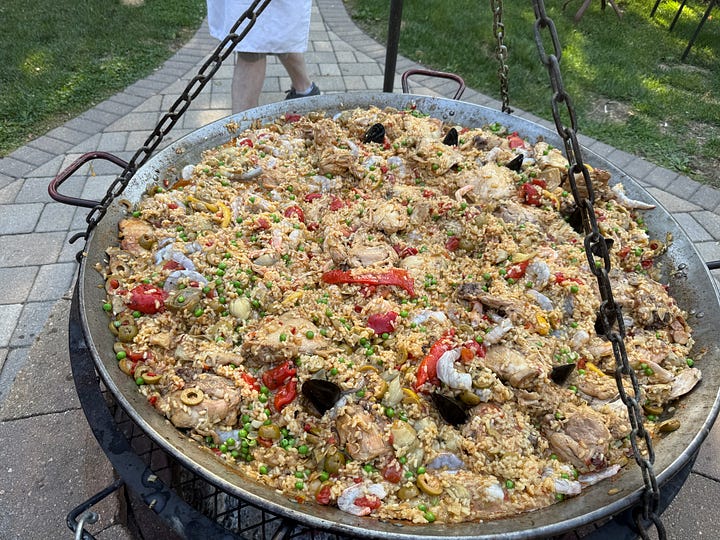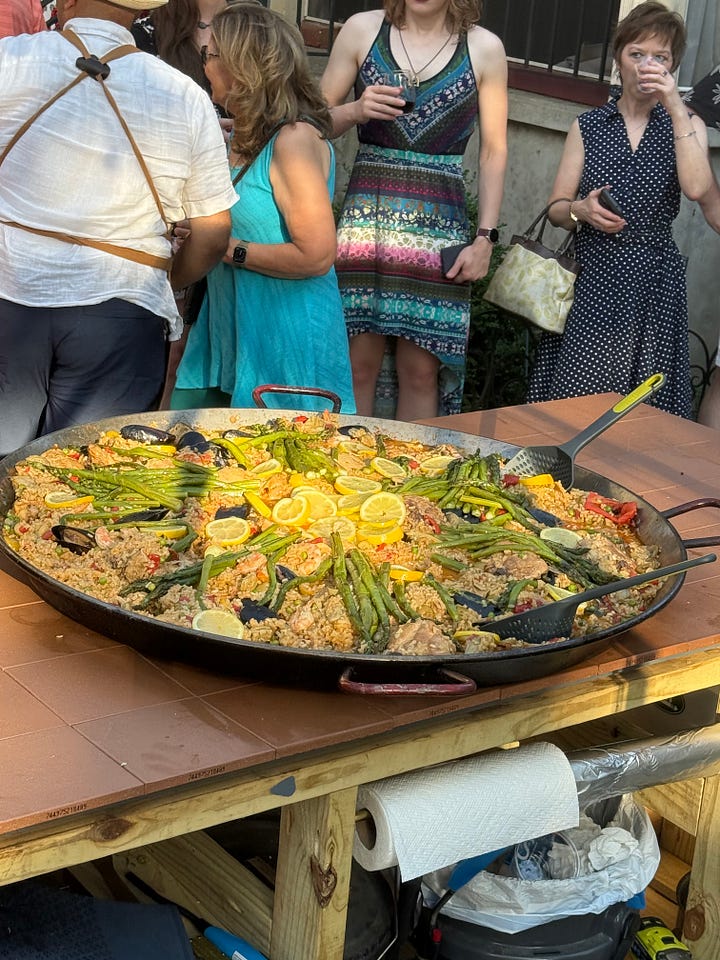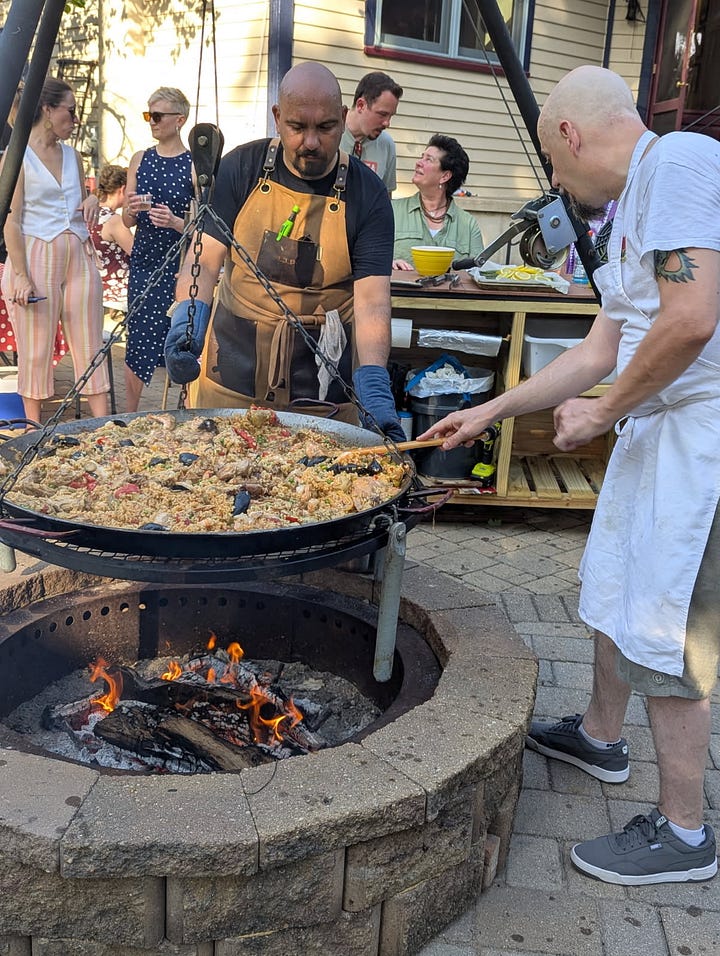Foreword
I’ve learned a lot from watching Brian tend fire. Yes, the literal kind that crackles under a paella pan, but also the kind that gathers people, builds relationships, and creates communities that hold when the world shakes.
I count myself lucky to be among those who have stood near such flames, warmed by their intention. Today, you get to gather around that fire in words.
May it steady you even in the cold aftermath of the fires that destroy.
Because there are still fires that heal.
And this essay is one of them.
—Katie Shaw Thompson
Fire is one of the oldest forces we know. It can warm or destroy, illuminate or consume. It is how we cook, how we gather, how we devastate. At its worst, fire is a weapon—dropped from war planes, launched from war ships, lighting the sky with ruin. At its best, fire is a hearth—a source of sustenance, of gathering, of life.
Fire means something to us.
It’s not just elemental—it’s intentional. We chose the hearth as our symbol because we believe in the kind of fire that brings people together, that warms bodies and spirits, that makes room for communion and conversation. That’s what The Warm Hearth is. And we don’t just write about it. We live it.
This weekend, we lit the hearth.
Every summer, my family hosts a party in our backyard, and we make paella the size of a wagon wheel. A 3-foot pan, heavy and wide, suspended over an open wood fire—not on bricks or a grill, but on a manual deer hoist, rigged like an altar. The hoist lets me raise or lower the pan with precision, controlling the heat by changing its height above the flames. It’s part invention, part ritual. Thirty pounds of chicken. Three kilos of rice. Shrimp, mussels, artichokes, peas, saffron, olives. Two gallons of broth simmering nearby. The dish feeds a hundred people.
It is absurd.
And it is beautiful.




I don’t do it for show. I do it because it means something. It’s become a ritual. Friends plan around it. Newcomers return. Strangers become neighbors. People bring their children, their stories, their whole selves. And for one evening, this backyard becomes something sacred—something whole.
The fire we build for the paella is refined fire. Held fire. Controlled, stable, intentional. It’s the fire of tradition, of labor, of hospitality. The fire of feeding people. Of building something that lasts.
That night, while the rice slowly absorbed its broth and the sun dipped low, we got the news: the United States had bombed Iran’s nuclear facilities. Not with drones or long-range missiles, but with B-2 bombers—manned stealth aircraft—escorted by full squadrons of fighters. A show of dominance. A misguided projection of power.
It wasn’t self-defense. It wasn’t even strategy. It was, as it so often is, destruction for its own sake. A favor. A threat. A gesture of allegiance, cloaked in shock and awe.
And the contrast was unbearable.
We had lit a fire to gather. They lit one to shatter.
We stood over rice and saffron. They flew over cities and fear.
And so I keep returning to this question:
What kind of fire are we tending?
Paella for a hundred is ridiculous.
It’s inefficient, impractical, expensive. It requires a pan you can’t store anywhere sensible, a fire you can’t walk away from, and a process that leaves your clothes and skin steeped in smoke. It’s hours of labor for a single meal. But that’s the point.
Because in that labor, we’re making a claim: what matters is worth the effort.
We live in a world shaped by speed and domination, by headlines that reward outrage and systems that reward detachment. To stand over a slow fire all afternoon, stirring broth and saffron into rice, is to act out a different set of values. It’s to say that care matters. That beauty is worth building. That people—strangers, neighbors, friends—deserve to be fed, seen, held.
In the moment, it may feel like just a party. But in truth, this is how change begins. Not through sweeping declarations or perfect plans, but through repeated acts of gathering. Through creating spaces where people feel safe enough to be fully themselves, and brave enough to connect with others doing the same.
These moments don’t announce themselves with fanfare. They sneak up quietly. A conversation that wouldn’t have happened elsewhere. A connection that deepens. A story that finds the right listener. Someone who realizes they’re not alone. These are the kinds of things that rarely make news—but they are the ground beneath anything worth building.
We’ve seen it. Year after year, these gatherings have created real bonds, unlikely friendships, mutual aid, shared purpose. That kind of community doesn’t happen by accident. It happens by design—and by fire.
What we’re tending here isn’t just food. It’s infrastructure. Emotional. Relational. Cultural.
And yes, the pan is enormous. But it does have a home—tucked under the stairs, accessible by a sliding wine rack in the kitchen. My own design. Because anything worth doing is worth overdoing.
The news broke sometime after sunset, when the air had cooled and the plates were full.
Someone checked their phone, then said it out loud: The U.S. just bombed Iran’s nuclear facilities. We looked around, unsure what to do with that sentence in the middle of a backyard celebration. It felt like hearing thunder on a clear night. Jarring, wrong, too big to process in the moment.
We did what we always do when the world tilts: we reached for our phones, trying to make sense of it, trying to verify. And there it was—confirmation. A full display of air supremacy - not just superiority. There’s a difference. A message, unmistakable in its intent: we can go wherever we want. We can strike whoever we choose. A capability we did not have to reveal.
It wasn’t strategic. It wasn’t preventative. It was power, exercised because it could be.
The contrast was impossible to ignore. The slow fire behind us, the gathered crowd, the laughter of children, the scent of saffron and smoke still hanging in the air—and above it all, the knowledge that elsewhere, fire had been unleashed not to feed, but to threaten and to burn.
And yet, someone said it quietly—“All the more reason to be here, doing this.” And the truth of it settled in.
Because if the world insists on reminding us how fragile things are, how quickly destruction can be summoned, how easily violence becomes policy—then what other choice do we have but to keep gathering? To keep feeding? To keep telling a different story? A better story.
This isn’t naïveté. It’s resistance.
Grief and rage have their place. But if all we ever do is lament the fire set by others, we risk forgetting we have fire of our own—fire we can use to hold each other, to heal, to light the path forward.
That’s why I do this. That’s why I will keep doing this.
Because in the face of missiles and headlines and despair, the most radical thing we can do may just be to gather around a table and say: Not this. Not us. Not tonight.
It’s one thing to witness destruction from a distance. It’s another to live beneath the flight path of a superpower.
There are people in Iran—people with names, families, dreams, routines—who woke up in a different world the morning after the bombing. Young adults who have never known what it feels like to be targeted by the full force of American military might now carry that knowledge in their bones.
We didn’t just bomb nuclear infrastructure. We bombed certainty. We bombed the illusion that some lines hadn’t already been crossed.
This wasn’t about strategy. We didn’t need to prove we could strike with precision using stealth bombers. That capability was already known, already theorized. We proved it anyway. Not because we had to—but because someone wanted to send a message. Because power, once amassed, demands spectacle.
We tipped our hand for no reason.
And in doing so, we did more than destabilize a region. We shifted the emotional and psychological ground beneath an entire population. We turned the abstract threat of war into an intimate reality. For a country of 92 million people.
Americans need to understand what this moment looks like from the other side. Because what we just did was someone else’s Pearl Harbor.
We have built a nation that reveres its own trauma. We speak solemnly of days when the sky opened and fire fell—when lives were lost without warning. We teach our children about those mornings. We build monuments to the pain.
And yet, we unleashed that same fear on others, not as a last resort, but as a demonstration.
This is not strength. This is hubris.
We are the most powerful nation on earth. And using that power this irresponsibly is not only unconscionable—it is deeply, dangerously weak. It makes us less safe. Less trusted. Less human.
We cannot keep pretending that military dominance is moral clarity. We cannot keep telling ourselves that force equals righteousness.
Because from the other side of the fire, all they see is terror falling from the sky.
And they will remember.
We are not powerless.
We are not helpless witnesses to a world spiraling out of control. We are participants—whether we admit it or not. The fire we fund, the fire we ignore, the fire we justify… it burns in our name.
But so does this one.
The fire under the paella pan. The fire behind the wine and laughter. The fire lit by hand, tended with care, offered not as threat but as welcome. That fire is ours, too.
And it matters.
It matters that people gathered under string lights and moonlight while bombers took off. It matters that we fed each other while someone else chose fear. It matters that we stayed—that we didn’t cancel the party or shrink from the news, but looked it square in the eye and said: all the more reason to be here, doing this.
Because when the world burns, it’s easy to believe the only fires that count are the ones that destroy. But that is a lie.
The fire that holds people close is older. Deeper. More dangerous to the machinery of empire than any weapon ever forged.
It creates bonds no bomb can break. It builds trust, memory, story, resistance. It makes neighbors of strangers. It makes courage possible.
And if enough of us choose to tend that fire—if we refuse to let our hearts grow cold in the face of cruelty—then there is still hope.
Not the hollow hope of headlines, but the hard-earned kind.
The kind that smells like saffron and smoke.
The kind that waits under the stairs, behind the sliding wine rack.
The kind that roars when called.
This is the fire we choose.
This is the fire we keep.
This is the fire that will outlast them all.




